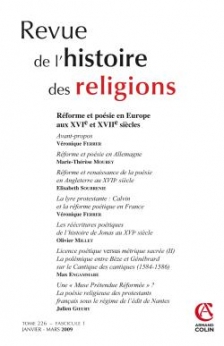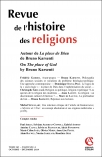
Revue de l'histoire des religions (1/2009)
Pour acheter ce numéro, contactez-nous
Recevez les numéros de l'année en cours et accédez à l'intégralité des articles en ligne.
Les manifestations de l’identité confessionnelle dans la poésie religieuse des protestants français sous le régime de l’édit de Nantes (1598-1685) sont de plus en plus difficiles à identifier et à interpréter au cours de la période. Cela s’explique certes en partie par une intériorisation des normes restrictives en matière de controverse, qui tend à marginaliser, puis à supprimer, toute forme de transgression, mais cela traduit sur tout une auto-limitation du champ de la muse chrétienne. Il s’agit dans cet article d’expliquer cette pratique de la dissimulation en la rapportant d’une part à la situation socio-historique des protestants français et d’autre part à un processus d’intégration dans un espace littéraire qui tend à imposer un discours chrétien conforme.
Under the Edict of Nantes (1598-1685), the signs of confessional affiliation in religious poetry by French Pro tes tants became less obvious and not as easy to identify and make sense of. This phenomenon can be partly explained by an internalizing of norms in a controversial context, which tends to marginalize, eventually to suppress, an y form of transgression ; but it is mainly the sign of the self- limitating of the Christian muse’s domain. This article aims at explaining this self- concealment, by replacing it in the socio- historical context which was that of French Pro tes tants, and relating it to a process of integration into a literary space which tends to impose a « proper » Christian discourse.

